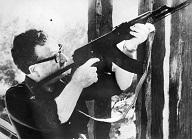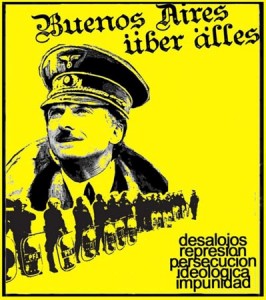World
The Chilean Road to Hell And/Or Socialism: A Nihilistic Workers’ Inquiry (Part 2)
Part 2 of an essay that begins here.
5.1. Health and Its Discontents
Some of my best friends, and I’m talking about people in their twenties or early thirties, the ones with truly radical and self-sacrificing souls, have been so terminally unhealthy and non-athletic, or anti-athletic, that in the rare moments that we end up playing a sport, they invariably fall ill, they turn red or purple, they vomit and they take to bed for days.
Square Dance With God
The author is a physician and priest who has been working in Haiti for more than a generation, running hospitals and social programs in Port au Prince as well as a Nuestros Pequenos Hermanos (NPH) orphanage on the outskirts of the capital. Fr. Frechette is the author of The God of Rough Places, the Lord of Burnt Men and First has often posted his stories from Haiti.
The Other 9/11
On September 11th, every year, it became a habit for certain melancholic leftists who consider themselves heretical thinkers to reflect, not on the Ouroboros of McEmpire and McJihad, or whatever, but on Allende shooting it out with fascist generals with Castro’s sub-machine gun.

The African Lady (Redux)
When Ta-Nehisi Coates was trying to make sense of the world as a young student, his first working theory “held all black people as kings in exile, a nation of original men severed from our original names and our majestic Nubian culture.” With help from teachers at Howard, Coates thought his way out of compensatory history. Coates’s movement of mind sent your editor back to the following post by Anita Franklin, which originally appeared here in 2013. B.D.
Very Serious Fantasts
P.W. Singer and August Cole have just published Ghost Fleet: A Novel of the Next World War.
Friends of Che
In memory of the failed Cuban Revolution, 1956-2014
Who Ain’t a Slave
It’s not enough for a writer to have no owner and no conscience, but it’s a good start. It’s not enough because when he or she emerges from his or her isolation and melancholia, from the pure futility of the inland empire of liberty, there’s still the literary market to worry about and family dinners with collaborationist in-laws.
Women and Children First
Coincident with the centennial celebration of the outbreak of World War I, I finished David Fromkin’s excellent A Peace to End All Peace: The Fall of the Ottoman Empire and the Creation of the Modern Middle East. Fromkin’s message, if I may paraphrase, is that since in took Western Europe 1500 years to get its shit together after the fall of the Roman Empire, we may have another 1400 of reports of madnesses and slaughters to look forward to ingesting each morning over coffee in The New York Times.
Tight Connection to My Heart
When I listen to critics of Hamas (and in the largest sense, Hamas needs not only to be criticized but defeated) (I’m not talking about Netanyahu but the so-called moderates who take time out of their presumably busy days to worry about Hamas’ strategy or its charter, which is to say its thoughts on the Zionist project), I wonder what these people were saying in the seventies and eighties…
Double-Truths
Eugene Goodheart offered two angles on the war in Gaza just before the cease-fire, speaking truth to powers that be on both sides of the conflict.
The Atrocity
If a gang of neo-Nazis had kidnapped a 16-year old boy in a London Jewish neighborhood in the dark of the night, driven him to Hyde Park, beaten him up, poured gasoline into his mouth, doused him all over and set him on fire—what would have happened?
Arab Soccer in the Disapora
1.
In a qualifying match against Brazil for the 1990 World Cup, Chile was on the verge of elimination when the goalkeeper Roberto Rojas cut himself with a razor and writhed on the ground next to a firework that had been thrown from the stands. What happened after that resembled a Zionist or neocon dreamscape: angry protestations, a bloodied body ceremoniously hauled away in a mock martyr’s cortege, and a subsequent humiliation of the supposed victim.
Lineages of the Absolutist State
…nil nisi bonum. —The Seven Sages
Got it! Alexander Cockburn died two years ago. And that, one would’ve thought, was that. But earlier this year, Perry Anderson decided to pick at the scab. His gassy, 19-page elegy for Cockburn is, of course, not worth reading; worse, I found it the entry point to the tour of a witless horizon. “With the posthumous publication of A Colossal Wreck, the triptych for which Alexander Cockburn will be remembered is complete,” reads the first sentence. It seems unlikely. Cockburn made a career of quick bursts of venom. Even in small doses, his writing was toxic. For Anderson to declare that it is for this that someone will be remembered, or even whether someone will be remembered at all shows that he hasn’t learned much from his many years. The “triptych” is a nice touch, though, very much in the tradition of Leonid Brezhnev’s Trilogy, which gathered dust in Russian bookstores during the Soviet Union’s last years, which Cockburn described as a Golden Age for the Soviet working class. Anderson devotes first few pages to a long appreciation of Claud Cockburn, the noted Stalinist wit and father of Alexander. Alexander was a good family man. But he was, foremost, a writer. Anderson praises him—sounding like a character in a David Lynch movie—for his “incomparable zing.” After Cockburn published something, “The response was electric.” He writes that “Alexander gave Reagan no mercy, in one blistering entry after another.” If Monty Python’s Black Knight ever needs a squire, now Cockburn’s gone, Perry Anderson’s still around. There are pages of blather about the man behind the turgid prose, with loopy phrases like “his debonair swathe” and “his feeling for l’Amérique profonde.” In fact, there was one interesting thing about Cockburn. It is possible to find ardent latter-day Stalinists, who affect a style, particularly sartorially, that announces their revolutionary purity. Cockburn captured the authentic 30’s manner: the bon vivant revolutionary. Perry Anderson is reliably oblivious. He writes about Cockburn’s collection of classic cars, an odd hobby for an arch-radical. For Anderson, it’s just more proof of Cockburn’s largeness of spirit. He tells us that, “His only close friends in New York were marginal to it: Edward Said, Palestinian in a fastness of Zionism; Andy Kopkind, gay out of New England; Ben Sonnenberg, cripple amid a forest of gyms.” Marginal? Said was probably the most celebrated academic in New York and an enormous cultural presence beyond the academy. New York is a magnet for both gay men and people from elsewhere in the country. And gimps are all over New York, if this deucey could be bothered to look. If you asked Perry Anderson what day it is, would he know?
If you asked him what was wrong with Cockburn, he wouldn’t know, and wouldn’t say. Over 30 years ago, I had my own moment with Cockburn’s writing. In 1981, I came across two old Cockburn columns. One was his last column before the 1980 election. He talked about how interesting a Reagan presidency might have been. Jimmy Carter’s re-election was a foregone conclusion. He called the election wrong. So did lots of people. But Cockburn’s sheer certitude was a thing apart. And being so wrong gave the lie to Cockburn’s pose; the truth-teller immune to ideology and bourgeois mystification. Cockburn proved to be some hybrid of David Gergen and an alley cat.
The other column picked up on a statement Brezhnev released in fall of 1979. He announced that he was, in the interest of peace, reducing the number of Soviet troops in East Berlin, and invited NATO to reciprocate. Cockburn applauded the statement and lambasted the American press for failing to trumpet Brezhnev’s statement. When, weeks later, the Red Army invaded Afghanistan, Cockburn declared that Afghanistan deserved to be raped. From Brezhnev to Milosevic to various Arab bully-boys, Cockburn had a soft spot for tyranny and genocide.
Notes on Chilean Literature (Or Those Queer Birds Disturbing the Necrophilic Silence of the Barrio Alto)
Perhaps then it would be easier to go, to leave behind a small puddle of tears, a tiny well of watery sadness that no secret police agent would ever be able to identify. Because a fairy’s tears have no color, no identification, no taste; they have never watered any garden of illusion. The tears of a poor, abandoned fairy like her would never see the light of day, would never be the humid worlds that absorbent handkerchiefs would blot off the pages of literature. The tears of a faggot always seem fake: utilitarian tears, clown tears, kinky tears, a cosmetic enhancement to eccentric emotions. –Pedro Lemebel (“cross-dresser, militant, third-world champion, anarchist, Mapuche indian by adoption…possessor of a painfully long memory…the best poet of my generation, though he doesn’t write poetry” –Roberto Bolaño)
Phantoms of Liberty
I recently read two memoirs: Luis Buñuel’s Mi último suspiro and Reinaldo Arenas’ Antes que anochezca. Buñuel’s memoir ends with the word tumba and Arenas’ ends with the word noche: words that are like broken talismans or coins that have lost their value with the vertiginous inflation of illness and the regime change that is death.
Does the Past Repeat Itself?
I have been reading the first volume of Churchill’s history of World War II, The Gathering Storm. How can one not be impressed with his relentless, hawkish criticism of the appeasing Chamberlain and the weak-kneed continental powers that were disarming while German was arming in the 1930s? Is there a lesson for today?
Song For My Father
When his father died last month, Fr. Frechette felt under an “obligation, which was also a privilege” to speak clearly about what his father had “learned by a long and full life, by illness, and by accepting death as his teacher.” Here is Fr. Frechette’s attempt to express his father’s earned wisdom.
Beast of No Nation
What follows is Francisco Goldman’s introduction to Oscar Martinez’s The Beast: Riding the Rails and Dodging Narcos on the Migrant Trail, which was published in the USA by Verso in 2013. First thanks Verso for allowing us to reprint Goldman’s tribute to Martinez’s audacious and skillful reporting on “the terrifying lives of Central American migrants.”
